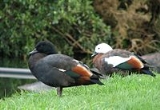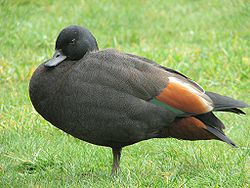
Paradise Shelduck
Encyclopedia

Goose
The word goose is the English name for a group of waterfowl, belonging to the family Anatidae. This family also includes swans, most of which are larger than true geese, and ducks, which are smaller....
-like duck
Duck
Duck is the common name for a large number of species in the Anatidae family of birds, which also includes swans and geese. The ducks are divided among several subfamilies in the Anatidae family; they do not represent a monophyletic group but a form taxon, since swans and geese are not considered...
endemic
Endemic (ecology)
Endemism is the ecological state of being unique to a defined geographic location, such as an island, nation or other defined zone, or habitat type; organisms that are indigenous to a place are not endemic to it if they are also found elsewhere. For example, all species of lemur are endemic to the...
to New Zealand
New Zealand
New Zealand is an island country in the south-western Pacific Ocean comprising two main landmasses and numerous smaller islands. The country is situated some east of Australia across the Tasman Sea, and roughly south of the Pacific island nations of New Caledonia, Fiji, and Tonga...
. They are known to the Māori as Pūtangitangi but now commonly referred to as the "Paradise duck", and are prized game birds. Both the male and female have striking plumage
Plumage
Plumage refers both to the layer of feathers that cover a bird and the pattern, colour, and arrangement of those feathers. The pattern and colours of plumage vary between species and subspecies and can also vary between different age classes, sexes, and season. Within species there can also be a...
, the male has a black head and barred black body, the female a white head with a chestnut body.
The Paradise Shelducks usually live as pairs, grazing on grass
Grass
Grasses, or more technically graminoids, are monocotyledonous, usually herbaceous plants with narrow leaves growing from the base. They include the "true grasses", of the Poaceae family, as well as the sedges and the rushes . The true grasses include cereals, bamboo and the grasses of lawns ...
and weeds, and will raid crops, particularly when molting.
Breeding
Paradise Shelducks form long-term pair bonds, often lasting for life, and defend territoriesTerritory (animal)
In ethology the term territory refers to any sociographical area that an animal of a particular species consistently defends against conspecifics...
. They have a long breeding season, lasting from August through December. They reach sexual maturity after two years, and build nests lined with grass and feathers hidden in high grass, inside hollow trees, or beneath rotting logs. The mean clutch size
Clutch (eggs)
A clutch of eggs refers to all the eggs produced by birds or reptiles, often at a single time, particularly those laid in a nest.In birds, destruction of a clutch by predators, , results in double-clutching...
is around nine eggs. Chicks fledge
Fledge
Fledge is the stage in a young bird's life when the feathers and wing muscles are sufficiently developed for flight. It also describes the act of a chick's parents raising it to a fully grown state...
after eight weeks.
History
Before Europeans settled in New Zealand the Maori hunted Paradise Shelducks in favoured districts. Hunting was done outside the breeding season when the birds were molting and could not fly. During the breeding season hunting them was forbidden. This conservation and selective hunting system ensured good supplies of food.Paradise Shelducks were uncommon prior to Europe
Europe
Europe is, by convention, one of the world's seven continents. Comprising the westernmost peninsula of Eurasia, Europe is generally 'divided' from Asia to its east by the watershed divides of the Ural and Caucasus Mountains, the Ural River, the Caspian and Black Seas, and the waterways connecting...
an settlement, however changes to habitat caused by the conversion of forest
Forest
A forest, also referred to as a wood or the woods, is an area with a high density of trees. As with cities, depending where you are in the world, what is considered a forest may vary significantly in size and have various classification according to how and what of the forest is composed...
to pasture
Pasture
Pasture is land used for grazing. Pasture lands in the narrow sense are enclosed tracts of farmland, grazed by domesticated livestock, such as horses, cattle, sheep or swine. The vegetation of tended pasture, forage, consists mainly of grasses, with an interspersion of legumes and other forbs...
, and the deliberate provisioning on ponds by hunting
Hunting
Hunting is the practice of pursuing any living thing, usually wildlife, for food, recreation, or trade. In present-day use, the term refers to lawful hunting, as distinguished from poaching, which is the killing, trapping or capture of the hunted species contrary to applicable law...
groups, has led to a large increase in the numbers of these ducks.
The name
The genus name Tadorna comes from Celtic roots and means "pied waterfowl", essentially the same as the EnglishEnglish language
English is a West Germanic language that arose in the Anglo-Saxon kingdoms of England and spread into what was to become south-east Scotland under the influence of the Anglian medieval kingdom of Northumbria...
"shelduck".
External links
- Paradise shelducks – pūtangitangi Te Ara: The Encyclopedia of New Zealand Database entry includes justification for why this species is of least concern

